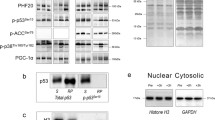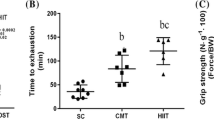Abstract
There is limited understanding of the mitochondrial adaptation following repeated eccentric exercise bouts, a model resulting in muscle adaptation known as the repeat bout effect. It was hypothesized that downhill training would reduce mitochondrial calcium content (MCC) post an acute eccentric bout with concurrent improvements in mitochondrial respiratory function. Thirty-four Sprague–Dawley rats were divided into four groups: control (N), control with acute eccentric exercise (N ecc), trained control (X) and trained with acute eccentric exercise (X ecc). Training for X and X ecc consisted of 30 min per day for five consecutive days of downhill treadmill running. The acute eccentric exercise bout was a −14° treadmill exercise for 90 min performed 2 weeks after the training period. Animals were killed 48 h post-exercise. Isolated mitochondria from the red quadriceps allowed for the measure of mitochondrial respiratory indices and MCC. Calpain activity and heat shock protein 72 expression (HSP72) were also measured. MCC dramatically increased following the acute bout of eccentric exercise in N ecc (p < 0.001), but did not change in X ecc. Mitochondrial respiratory function tended to be slightly depressed in N ecc (state 3 respiration, p = 0.053; respiratory control ratio, p = 0.098) and unaltered in X ecc. Previous training altered the calpain and heat shock protein response to an acute bout of eccentric exercise. The results suggest that downhill exercise training improves mitochondrial calcium homeostasis following an acute bout of prolonged eccentric exercise and may stabilize mitochondrial respiratory function. These improvements coincide with a reduction in calpain activity and heat shock protein upregulation.







Similar content being viewed by others
References
Armstrong RB, Ogilvie RW, Schwane JA (1983) Eccentric exercise-induced injury to rat skeletal muscle. J Appl Physiol 54:80–93
Arthur GD, Booker TS, Belcastro AN (1999) Exercise promotes a subcelluar redistribution of calcium-stimulated protease activity in striated muscle. Can J Physiol Pharm 77:42–47
Ascensão A, Magalhães J, Soares JMC, Ferreira R, Neuparth MJ, Marques F, Oliveira PJ, Duarte JA (2006) Endurance training limits the functional alterations of heart rat mitochondria submitted to in vitro anoxia–reoxygenation. Int J Cardiol 109:169–178
Balnave CD, Thompson MW (1993) Effect of training on eccentric exercise-induced muscle damage. J Appl Physiol 75:1545–1551
Bartoli M, Bourg N, Stockholm D, Raynaud F, Delevacque A, Han Y, Borel P, Seddik K, Armande N, Richard I (2006) A mouse model for monitoring calpain activity under physiological and pathological conditions. J Biol Chem 281:39672–39680
Belcastro AN (1993) Skeletal muscle calcium-activated neutral protease (calpain) with exercise. J Appl Physiol 74:1381–1386
Butterfield TA, Best TM (2009) Stretch-activated ion channel blockade attenuates adaptations to eccentric exercise. Med Sci Sports Exerc 41:351–356
Chang J, Wasser JS, Cornelussen RNM, Knowlton A (2001) Activation of heat-shock factor by stretch-activated channels in rat hearts. Circulation 104:209–214
Dohm GL, Huston RL, Askew EW, Weiser PC (1972) Effects of exercise on activity of heart and muscle mitochondria. Am J Physiol 223:783–787
Dohm GL, Huston RL, Askew EW, Fleshood HL (1973) Effects of exercise, training, and diet on muscle citric acid cycle enzyme activity. Can J Biochem Cell B 51:849–854
Duan C, Delp MD, Hayes DA, Delp PD, Armstrong RB (1990) Rat skeletal muscle mitochondrial [Ca2+] and injury from downhill walking. J Appl Physiol 68:1241–1251
Duhamel T, Stewart R, Tupling AR, Ouyang J, Green H (2007) Muscle sarcoplasmic reticulum calcium regulation in humans during consecutive days of exercise and recovery. J Appl Physiol 103:1212–1220
Enns D, Raastad T, Ugelstad I, Belcastro A (2007) Calpain/calpastatin activities and substrate depletion patterns during hindlimb unweighting and reweighting in skeletal muscle. Eur J Appl Physiol 100:445–455
Foley JM, Jayaraman RC, Prior BM, Pivarnik JM, Meyer RA (1999) MR measurements of muscle damage and adaptation after eccentric exercise. J Appl Physiol 87:2311–2318
French JP, Quindry JC, Falk DJ, Staib JL, Lee Y, Wang KKW, Powers SK (2006) Ischemia–reperfusion-induced calpain activation and SERCA2a degradation are attenuated by exercise training and calpain inhibition. Am J Physiol Heart C 290:H128–H136
Fu M, Tupling AR (2009) Protective effects of Hsp70 on the structure and function of SERCA2a expressed in HEK-293 cells during heat stress. Am J Physiol Heart C 296:H1175–H1183
Goonasekera SA, Lam CK, Millay DP, Sargent MA, Hajjar RJ, Kranias EG, Molkentin JD (2011) Mitigation of muscular dystrophy in mice by SERCA overexpression in skeletal muscle. J Clin Invest 121:1044–1052
Halestrap A (2005) Biochemistry: a pore way to die. Nature 434:578–579
Halestrap AP, McStay GP, Clarke SJ (2002) The permeability transition pore complex: another view. Biochimie 84:153–166
Holloway GP, Green HJ, Duhamel TA, Ferth S, Moule JW, Ouyang J, Tupling AR (2005) Muscle sarcoplasmic reticulum Ca2+ cycling adaptations during 16 h of heavy intermittent cycle exercise. J Appl Physiol 99:836–843
Kar P, Samanta K, Shaikh S, Chowdhury A, Chakraborti T, Chakraborti S (2010) Mitochondrial calpain system: an overview. Arch Biochem Biophys 495:1–7
Li JL, Wang XN, Fraser SF, Carey MF, Wrigley TV, McKenna MJ (2002) Effects of fatigue and training on sarcoplasmic reticulum Ca2+ regulation in human skeletal muscle. J Appl Physiol 92:912–922
Liu J, Kam KWL, Borchert GH, Kravtsov GM, Ballard HJ, Wong TM (2006) Further study on the role of HSP70 on Ca2+ homeostasis in rat ventricular myocytes subjected to simulated ischemia. Am J Physiol Cell Ph 290:C583–C591
Lumini-Oliveira J, Magalhães J, Pereira CV, Moreira AC, Oliveira PJ, Ascensão A (2011) Endurance training reverts heart mitochondrial dysfunction, permeability transition and apoptotic signaling in long-term severe hyperglycemia. Mitochondrion 11:54–63
Lynn R, Talbot JA, Morgan DL (1998) Differences in rat skeletal muscles after incline and decline running. J Appl Physiol 85:98–104
Madsen K, Ertbjerg P, Djurhuus MS, Pedersen PK (1996a) Calcium content and respiratory control index of skeletal muscle mitochondria during exercise and recovery. Am J Physiol 271:E1044–E1050
Madsen K, Ertbjerg P, Pedersen PK (1996b) Calcium content and respiratory control index of isolated skeletal muscle mitochondria: effects of different isolation media. Anal Biochem 237:37–41
Magalhaes J, Lumini J, Fraga M, Oliveira PJ, Ascensao A (2009) Eccentric exercise impairs respiratory function and increases susceptibility to permeability transition in skeletal muscle mitochondria. Med Sci Sports Exerc 41:60
McKenna MJ, Harmer AR, Fraser SF, Li JL (1996) Effects of training on potassium, calcium and hydrogen ion regulation in skeletal muscle and blood during exercise. Acta Physiol Scand 156:335–346
Mogensen M, Bagger M, Pedersen PK, Fernstrom M, Sahlin K (2006) Cycling efficiency in humans is related to low UCP3 content and to type I fibres but not to mitochondrial efficiency. J Physiol 571:669–681
Molnar AM, Servais S, Guichardant M, Lagarde M, Macedo DV, Pereira-Da-Silva L, Sibille B, Favier R (2006) Mitochondrial H2O2 production is reduced with acute and chronic eccentric exercise in rat skeletal muscle. Antioxid Redox Sign 8:548–558
Mukherjee A, Wong TM, Templeton G, Buja LM, Willerson JT (1979) Influence of volume dilution, lactate, phosphate and calcium on mitochondrial functions. Am J Physiol Heart C 237:H224–H238
Orsini F, Migliaccio E, Moroni M, Contursi C, Raker VA, Piccini D, Martin-Padura I, Pelliccia G, Trinei M, Bono M, Puri C, Tacchetti C, Ferrini M, Mannucci R, Nicoletti I, Lanfrancone L, Giorgio M, Pelicci PG (2004) The life span determinant p66Shc localizes to mitochondria where it associates with mitochondrial heat shock protein 70 and regulates trans-membrane potential. J Biol Chem 279:25689–25695
Paulsen G, Vissing K, Kalhovde JM, Ugelstad I, Bayer ML, Kadi F, Schjerling P, Hallen J, Raastad T (2007) Maximal eccentric exercise induces a rapid accumulation of small heat shock proteins on myofibrils and a delayed HSP70 response in humans. Am J Physiol Reg I 293:R844–R853
Picard M, Taivassalo T, Ritchie D, Wright KJ, Thomas MM, Romestaing C, Hepple RT (2011) Mitochondrial structure and function are disrupted by standard isolation methods. PLoS One 6:e18317
Rattray B, Caillaud C, Ruell P, Thompson M (2011) Heat exposure does not alter eccentric exercise-induced increases in mitochondrial calcium and respiratory dysfunction. Eur J Appl Physiol 111:2813–2821
Sonobe T, Inagaki T, Poole DC, Kano Y (2008) Intracellular calcium accumulation following eccentric contractions in rat skeletal muscle in vivo: role of stretch-activated channels. Am J Physiol Reg I 294:R1329–R1337
Stupka N, Tarnopolsky MA, Yardley NJ, Phillips SM (2001) Cellular adaptation to repeated eccentric exercise-induced muscle damage. J Appl Physiol 91:1669–1678
Tate CA, Bonner HW, Leslie SW (1978) Calcium uptake in skeletal muscle mitochondria II. The effects of long-term chronic and acute exercises. Eur J Appl Physiol 39:117–122
Terjung RL, Baldwin KM, Mole PA, Klinkerfuss GH, Holloszy JO (1972) Effect of running to exhaustion on skeletal muscle mitochondria: a biochemical study. Am J Physiol 223:549–554
Thompson H, Clarkson P, Scordilis S (2002) The repeated bout effect and heat shock proteins: intramuscular HSP27 and HSP70 expression following two bouts of eccentric exercise in humans. Acta Physiol Scand 174:47–56
Tupling A, Green H, Roy B, Grant S, Ouyang J (2003) Paradoxical effects of prior activity on human sarcoplasmic reticulum Ca2+–ATPase response to exercise. J Appl Physiol 95:138–144
Acknowledgments
Sports Knowledge Australia is acknowledged for providing PhD scholarship funding for Dr Ben Rattray.
Conflict of interest
The authors declare that they have no conflict of interest.
Author information
Authors and Affiliations
Corresponding author
Additional information
Communicated by Håkan Westerblad.
Rights and permissions
About this article
Cite this article
Rattray, B., Thompson, M., Ruell, P. et al. Specific training improves skeletal muscle mitochondrial calcium homeostasis after eccentric exercise. Eur J Appl Physiol 113, 427–436 (2013). https://doi.org/10.1007/s00421-012-2446-1
Received:
Accepted:
Published:
Issue Date:
DOI: https://doi.org/10.1007/s00421-012-2446-1




